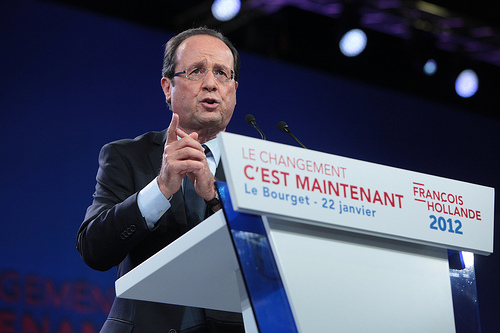Francois Hollande’s election as the new President of France in May represents a significant break in economic policy for the country. The Socialist President, the first since Francois Mitterand in 1995, aims to overhaul France’s overhaul and kick start growth through policies that aim to curb banking excesses, tax the wealthy, and negotiate new packages with the EU to stimulate the French and European economy. However, Mitterand does face challenges to implement his ambitious plans to produce a 4.5% deficit reduction over the next few years. While the details of Hollande’s first budget will be unveiled on July 4th, it is worth reviewing some of the policies outlined during the Presidential elections.

Key Areas
Hollande more generally aims to lower the deficit through higher taxes, greater investment in public services, and a lowering of ministerial pay and departmental waste. One key policy that is likely to go into effect this year is the separation of retail banks from investment banks. This move should allow banks to not take risks with their clients’ funds. Hollande also promotes tax rises for corporations, with a 75% tax band for those earning over 1 million Euros, and a 45% tax on earners over 150,000. The new Government also aims to cut tax loopholes that allow corporations to avoid paying income and capital gains taxes, and will try to implement reductions in the salaries of public companies. Moreover, there may be a Tobin tax on financial transactions above a certain amount.
In terms of pumping money back into French services, Hollande plans to spend heavily on education, creating the resources for new teaching jobs, and investing more on infrastructure. Young French people currently in unemployment may also receive subsidised jobs under new Government schemes. By comparison, Hollande aims to reverse Sarkozy policies and lower the retirement age to 60. The general taxation plans of the Hollande government will attempt to merge income tax and the General Social Contribution in France to clarify tax rates.
EU
However, before Hollande can try to push through these policies, he will have to negotiate France’s position within the fragile Eurozone. France needs to generate between 7 billion to 20 billion Euros to cut the deficit, and plan to do so without resorting to the austerity measures and welfare and public service cuts seen elsewhere in Europe. Hollande recently met with German Chancellor Angela Merkel to discuss how finance reforms within the EU can produce recovery through finance reforms of trade, greater subsidies for labour, and a commitment to lower inflation rates in Southern Europe. Hollande may, however, face resistance from austerity-focused governments over the level of spending that can be arranged to solve these problems.
Limitations
There have already been suggestions that Hollande’s election winning promise to tax the rich and improve public services could emulate the promises of President Mitterand in 1981, when increased taxation and high spending were gradually replaced by a period of economic austerity. Hollande has made a five year forecast for balancing the budget, albeit with the knowledge that it has been 30 years since France last achieved this.
Hollande also has to contend with France’s bond price dropping 2.87% in June, and criticism of a turn towards supply side economics, or a focus on stimulating production and a laissez-faire trading policy. Others suggest that the steep tax rate on the rich could produce a wave of super rich tax exiles. The budget announcement on July 4th should clarify many of Hollande’s ambitions, and will set a schedule for the new Government’s attempts to kick start the French economy.
Citations:
- Image courtesy of Parti socialiste
- Image courtesy of Parti socialiste
Brought to you by the bloggers from Cheznous. Offering holidays in France.

